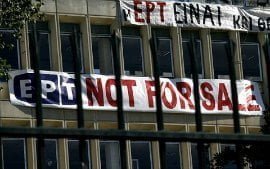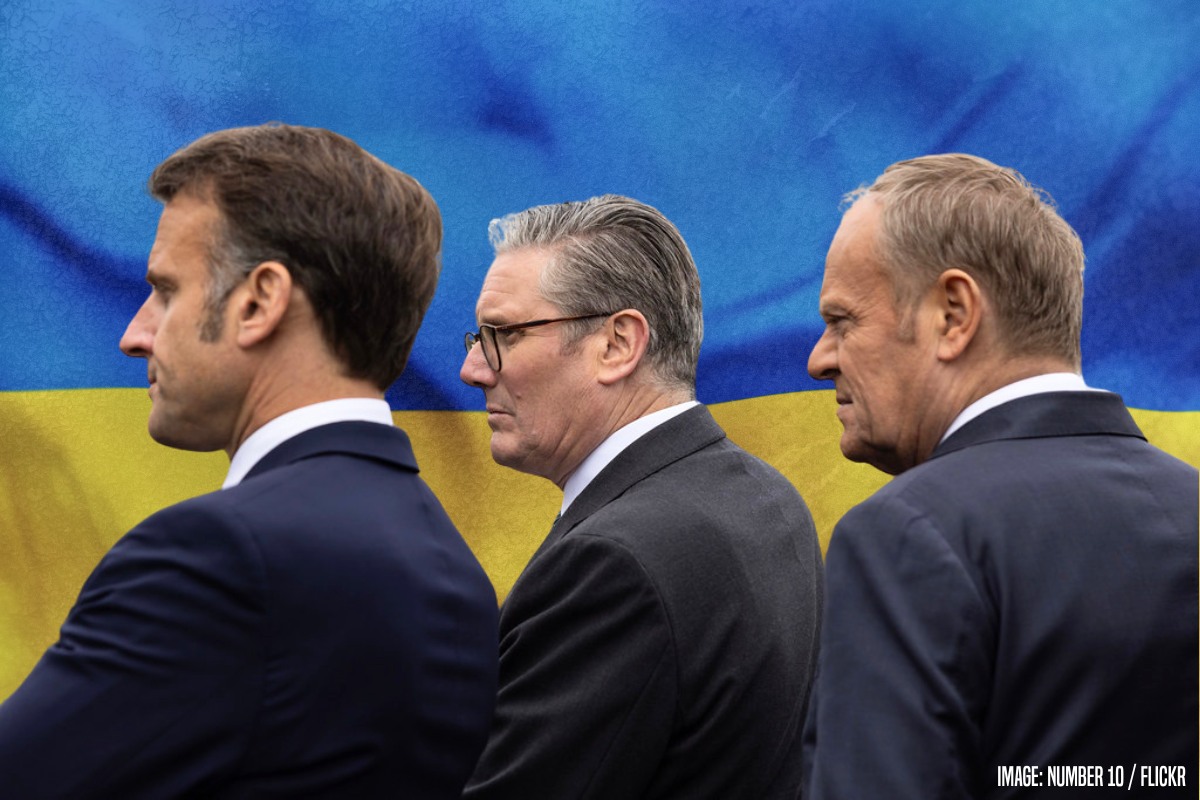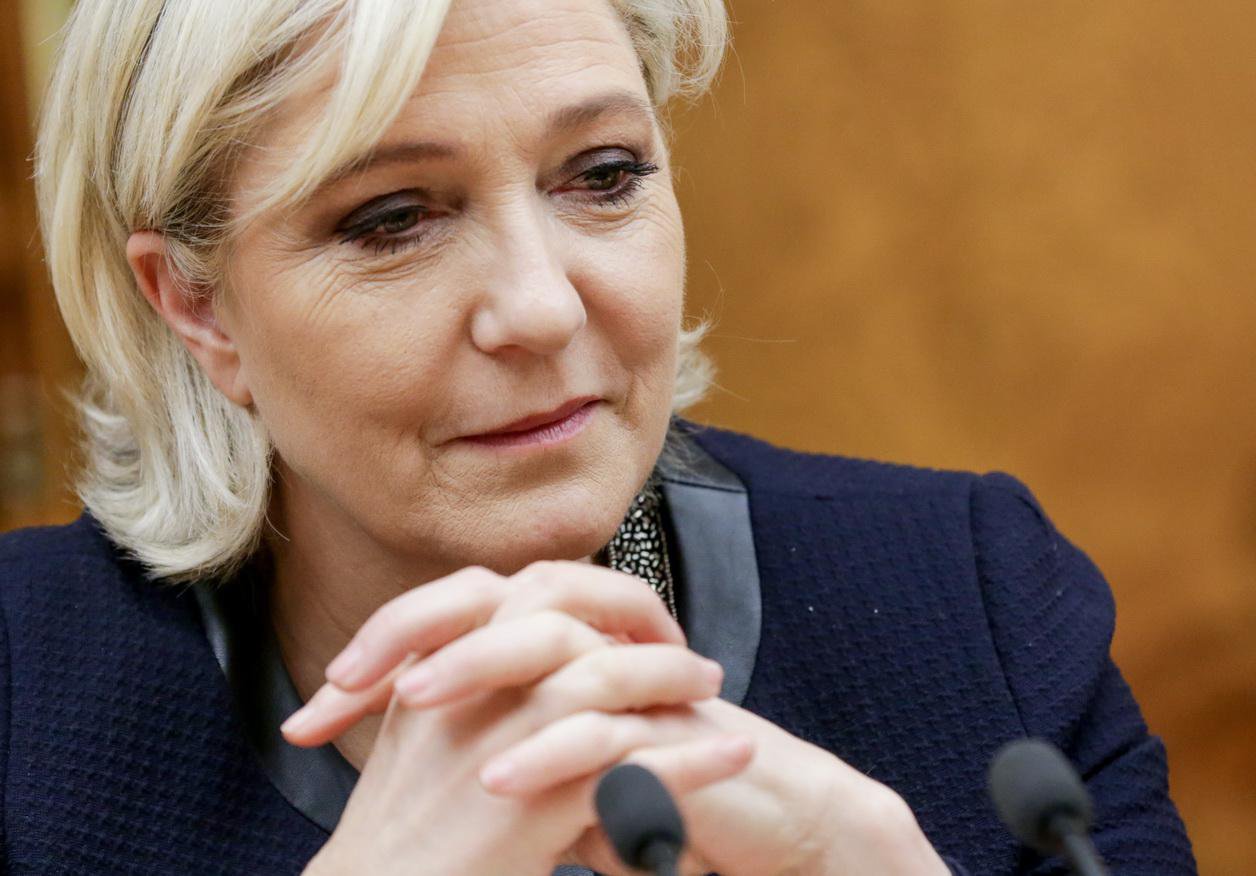On 29th July, Socialist Appeal supporters Lee McNeish and Gavin Jackson visited the occupied headquarters of the Greek public broadcaster ERT in Athens, which – at the time – had been operating for 45 days under workers’ control. We were granted an interview with the elected spokesperson of the journalists, Nikolas Tsimpidas, who spoke about the background to the occupation and the wider political struggle in Greece.
On 29th July, Socialist Appeal supporters Lee McNeish and Gavin Jackson visited the occupied headquarters of the Greek public broadcaster ERT in Athens.
After 45 days operating under workers control – following the attempt by the government to shut it down to save money – with the bosses locked out, and despite frayed tempers and frustration beginning to show, we still received a warm welcome.
We were granted an interview with the elected spokesperson of the journalists, Nikolas Tsimpidas, one of an elected committee of 11 responsible for the day-to-day operations of the staff. To this day the national and local stations of ERT continue to broadcast, illegally, under democratic worker’s control.
The courage and political fortitude of these workers in struggle should serve as an inspiration to us all in the task of defeating the austerity governments of Europe and taking the first steps to ushering in the world socialist revolution.
In this interview [see audio recording, with transcript below] comrade Tsimpidas explains that the struggle of the ERT workers is now reaching a critical phase. Where the occupation began with around 2,000 workers and their families occupying and operating 19 sites, with broad support amongst broad layers of the Greek population and 40,000 strong demonstrations in support, and 20,000 or more people moving through the headquarters in Athens in the first four to five days, the occupation ebbed in July to a core of a few hundred or more.
Speaking to these comrades, however, reveals the colossal leaps in political consciousness made in the course of the struggle, which has stretched over the course of two years – a period of strikes then seizing the facilities themselves. The occupation continues, despite the efforts of the Greek state and the ruling class – which has involved everything short of a direct assault on the building by the police.
As a living, breathing example of workers control in Europe, it is difficult to convey the atmosphere of the occupation and the electrifying affect discussing with the ERT comrades can have, even at a time of ebb when defending their positions and holding the line is their immediate aim.
In spite of this, here we have a direct, organic confirmation of the political perspectives produced by Socialist Appeal and the International Marxist Tendency – austerity in Europe is driving the workers and youth on to the road of bitter struggle, and this leads directly to the socialist revolution, joining hand in hand with the Arab revolution.
Where individual workplaces are pushed in to a bitter struggle with the bourgeois and the state, they rapidly draw political conclusions, moving from their own particular economic struggle to the political plane, and to the crisis in society in general.
This is what is signified by the workers of ERT openly discussing the need for a political general strike to bring down the political puppets of the Troika, the Samaras government, in order to win. Such are the days we are living through!
The ERT struggle is at a critical stage. Any moral or material support will be welcomed. These comrades have entrenched themselves to see out August, in preparation for a turn in the situation in September – the beginning of the period of strikes and open struggle, in which they hope to gather support around the occupation again.
The key, however, is not simply holding out for reinforcements in the shape of the coming September struggles, but, more important than this, is a perspective which will lead to victory.
The Samaras government has thrown itself on the tender mercies of the Troika – particularly German capitalism, on which the Greek bourgeoisie are becoming progressively more dependent for their survival. In turn German imperialism presses its’ heel at the throat of the Greek masses. The iron law of capitalism demands a blood sacrifice at the alter of profit. Not only the livelihoods of the ERT workers, but the future of the Greek and wider European working class and youth, is at stake.
For both comrade Tsimpidas and the other workers we spoke to, the question of the fate of the Samaras government cannot be avoided, only delayed. There are limits to this also. It is a matter of victory for the occupied ERT, or victory for the Troika-Samaras government. The question of a political general strike – that is the revolutionary overthrow of the Troika-Samaras government – is rapidly gaining ground. The ERT comrades have proven they can work without bosses, without editors – the masses of Greece can prove they can run all society without bosses, without bankers, without corrupted politicians!
The history of the world working class shows, however, that for the revolution to take place, for the insurrectionary strike to begin, there must be a leadership of one sort or another for the movement to crystallise around, allowing it to reach a critical mass. In Egypt this centralising role was played in 2011, not only by Tahrir Square, but particularly with the decisive strikes carried out by the workers of Mahalla and the Suez Canal. Time is absolutely crucial in this process, wait too long and the white heat of the class struggle will begin to cool, and the ruling class will move back on to the offensive.
The workers of Greece are looking for a lead – these workers in ERT say this themselves. If the workers of ERT were to resolve to use their broadcast facilities, which still reach the homes of more than half the Greek population, to call for the following programme the entire situation in Greece and Europe can be turned on its’ head:
- Organise the political general strike until the Samaras government is overthrown!
- Form assemblies and committees in every factory, office, school, university and neighbourhood to organise the strike, the provision of supplies, medical care, transport and the defence of the strike from the Police and Golden Dawn thugs.
- For the formation of a united front of the Greek workers, on the basis of a Syriza-KKE coalition, with a programme of repudiating the debt and the memoranda, reversing all the austerity measures, nationalising the banks and commanding heights of the economy, bringing democratic workers control on the model of ERT to every workplace, and organising the economy on a central democratic plan of production and distribution.
- An appeal to the workers of Europe and the world for their full solidarity, the best way we outside of Greece can do this is to carry out the socialist revolution the world over.
- Victory to the occupied ERT! Forward to the revolution in Greece as the opening of the European and World socialist revolution!
Gavin Jackson: Do you mind explaining a little bit about what your role is in ERT?
Nikolas Tsimpidas: As a journalist I am a political editor for the radio covering mostly parliamentary issues and I am also the union representative for the journalists, one of the two that the journalists have in ERT. I am elected by the colleagues from the radio and the website of ERT.
So where do we stand right now? This is the 45th day of us being in here and operating ERT as we did before. People tend to avoid the use of the word occupation but in a sense it is, since the state wants this building back. We hold those means of production; we are still in the building…This is a continuous struggle since day one.
This is a project of self-organised work while having the boss against us and in this situation the boss is the state. The state has made clear in every way possible that it wants everything back and we should not use this – the means of production; we should not use the cameras, the studios, etc. And to do that it [the Greek state] has used every known way historically, and everything that is being expected from the state that it would use, apart from the police, so far.
They shut down our transmitters that day, especially in Athens and in Salonika, so that’s why this black screen appeared in everybody’s living rooms. Since then they have tried to do that with the rest of the transmitters around Greece. Of course we mobilised our workers, our colleagues, people in society in general, and we managed to stop many of those attempts, although they managed to shut down three main transmitters, which means about 35-40% of Greece cannot receive us in any way, apart from the internet.
45 days after the initial attempt to shut us down we still broadcast to 60-65% of the country in analogue…and we transmit to about 80-85% in radio in all of the country. ERT has 19 local stations all over Greece and all of them are still operational; colleagues are in the buildings, they have programmes live on the air, transmitters are on, and this is a great, great thing if one considers what we have come up against every day. This is the part where they tried to shut us down with police, technical means etc.
The second phase of course is to divide – divide in order to conquer. So they [the state] tried to turn the technicians against the journalists, the journalists against the musicians, the musicians against everybody, etc.
How did they try to do that? They approached some people who are pro-government by promising various things; that they were going to build a new ERT – “its better for you to be in that new ERT than staying here fighting a struggle that’s already lost”, etc.
Then when they found out that they cannot do this transition quite so smoothly and in such a short period of time, they invented an in-between stage, which they were to use to get to the new ERT. This is the television channel that they broadcast on the air at the moment; it’s called ‘Public TV’. And now they try to convince people to go and apply to work in this hybrid, this transitional state. And they try to divide us with that way, that “some of you can actually have a job tomorrow, so come and apply for the transitional phase and everybody who’s left behind, nobody can do anything about them they are doomed”.
Despite all their efforts, we are still here, after 45 days. Things are tough. People are short of money. There’s no wages anymore. We’ve only received a small part of our compensation from the compensation funds. People are tired, emotionally and physically. As you know, in every struggle, no matter how many people [are involved], only some of them, a few of them, are really willing to fight [to the end] and really support the struggle, so this tiredness is starting to show. Despite that we are still here.
How do we operate? From the journalists side of things there is a committee, let’s say a struggle committee, which is led by eleven people and those eleven people are trying to run everything, from what’s going on air to where can we find printing materials.
Lee McNeish: Are these people being elected from amongst the staff or are these people fulfilling roles they were already, previously, fulfilling?
NT: There is a mixture of both. Me and my colleagues are elected by formal elections – we are formally elected representatives. There used to be a smaller committee when we had our strikes in the winter. So in a sense those people involved in that part of the fight were reinstated and some of the rest of the people just came forward due to the situation, they were the people that were mostly involved.
We have a general assembly every week. All the decisions are subject to the approval of the General Assembly. The General Assembly in a sense decides everything. The main focus of the last four to five days has been the political part of the struggle, and not so much about the rest of the stuff. [Nikolas refers here to how the journalists organise, the technical and administrative staff work through their ten existing unions which feed into similar general assemblies and submit decisions for approval to them.]
LM: When it came to the General Assemblies, you were saying most of it was discussing politics, the political aspect of it – is this politics in the direct sense to do with the current situation or is it politics in a grander sense of trying to understand exactly why you’re in this situation in the first place?
NT: Most of it is politics that have to do directly with the situation, although politics in a general sense is discussed in those assemblies, although it’s very premature to get a general political decision from those assemblies because everybody is focused on this problem and how this particular problem is going to be solved.
This of course creates our differences, because at the same time everybody recognises that this is a political problem and cannot be solved by certain political decisions made by the government.
And this creates quite some tension because it’s quite a paradox: you have people that claim that the only way to resolve the situation, and reverse the situation, is to overthrow the government. But at the same time, [there are] those people [who] say that we don’t have the power to do that, so we have to try to improve our position in this difficult situation.
GJ: Has using the broadcasting facilities to actually promote that option been considered – that the government needs to be overthrown, that new elections are needed?
NT: If that was a unanimous decision then we could use those means to say that. With one voice. But since that is not decided by any General Assembly you cannot go on air and say ‘we demand the government must fall, etc.’
GJ: So, my understanding of democratic decision making, if it’s fifty percent plus one, then that’s the decision of the General Assembly. I can understand you’d want a unanimous decision on something on this sort of scale – and something on this scale in the work that you’re doing here. But the flip side of that is the question – is it accepted that’s the only way to do it?
NT: Yeah, sometimes you have to put it on the table and decide on that. You’re absolutely right. But so far, the main focus has been how to negotiate from a stronger position with the government and this already has created a split within the workers.
Many of our colleagues left after the two last General Assemblies because they disagree with the rest of us who decided to continue the struggle, despite the denial from the government – the government denied all of our proposals. We sent four proposals to the government and they didn’t discuss any of them. And those colleagues said that we should accept what they are offering but the majority said “no, we have to continue”. In those assemblies great effort was made to have a unanimous decision rather than go to ballots, etc., to vote. In every decision we try to be unanimous and not have to vote, in order not to create this atmosphere of division. But the last two assemblies that wasn’t possible and we had to lead the assembly to a vote. In both situations the vote was overwhelmingly pro – to continue this fight and this struggle.
LM: How confident are you about winning this? Is the morale still good? I know you said as the fight continues you’re getting worn down but you’re still here.
NT: Morale is battered at this point of time. Not critically, but we really need something that will lift the morale up a bit – some small victory. We’ve had many of those in these 45 days – but the past one or two weeks we didn’t really exist because their efforts to divide us are getting stronger and stronger.
GJ: In terms of morale, is there any discussion on how to win, how to beat the government in the end?
NT: The people who are supporting the idea of continuing the struggle will continue to support this on the basis that if we survive August, this will lift us up. This will lift us up, and will lift up our morale because we will go through a difficult period, a difficult month. And that will put us in a very strong position going into the autumn. Everybody in the autumn expects things to be very, very active in the main political scene. Many predict early elections, or other situations, tensions in the society etc.
GJ: Just as a hypothetical, our comrades in the International Marxist Tendency, in Epanastasi [Revolution], a large part of the program they put forward now is to organise an indefinite general strike with the aim of forcing new elections and…
NT: …political strike, the political strike that would be continuous. Look, it’s an idea that is gaining ground in Greek society. Is Greek society there yet ? Apparently not. Can it reach that point? Probably.
GJ: Just to continue the same line. Looking toward September, I can fully appreciate where you’re coming from: you’re looking at a lot of social tensions building up – if it’s your own view as an elected representative of ERT or your own personal view, do you think it’s reasonable perhaps at that point if you have survived August to use the facilities to put forward a program in wider Greek society of…
NT: …that would be a possibility. Not having this decision in a clear way, just the fact you would be out there….opposite to all the other media establishments which would say one thing and one thing only, what the government wants to say, that would put you in a good position…that would signify a political stance, quite clearly.
And this is what we are trying to do. If that will contribute to having a political strike, that is another thing. But you know – one step at a time. It is only a few months since the idea of a political strike has begun to be projected so strongly, and it’s already gaining ground.
If we manage to get ourselves back and re-open ERT even under a new name it would be very difficult to make us change the way we see and say things; because occupation is a great experience and it’s something that stays with you the rest of your life.
And this is one thing; the fact that you have proven to yourself that you can do your work without bosses and you can do your work without anyone telling you how to do your work – and this is the most important thing.






